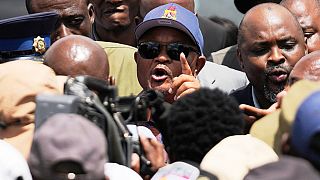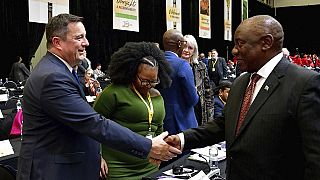South Africa
Frustrated over the pace of housing delivery and poor living conditions in informal settlements in South Africa, a group of people from informal settlements in Tshwane municipality in May gathered to protest poor, overcrowded living conditions.
They also demand resettlement, after attempts to occupy a nearby space was met with threats by private land owners.
More than two decades after the end of apartheid rule, most of South Africa’s land is still in the hands of the minority whites.
The ruling Africa National Congress (ANC) has long been committed to redistributing it with President Jacob Zuma renewing promises to change the constitution to expropriate land without compensation and redistributing it.
But the pace has been slow, relying mostly on a “willing buyer, willing seller” policy intended to respect property rights seen as vital to sustaining Africa’s most industrialized economy.
“What we are crying for is land, because they have been saying our land is available. But where is it? We have nowhere to go except living in these shacks that burn easily,” said Solomon Nkwane, a protester in Tshwane.
“The biggest issue for us right now is land… that’s it. We want land and services and to get electricity and water so that we can do our things and so that our children can live like all the other people,” said another protester Patricia Jafta.
In May, more than 400 residents of Orange Farm, a township about 45 kilometers south of Johannesburg laid claim to private land and clashed with police that tried to bring down their makeshift shacks.
The Mayor of Tshwane, Solly Msimanga says land invasions actually counter efforts by the government to improve services.
“You have a lot of people that occupy land illegally and sometimes even on a private piece of land and then demand that the municipalities are supposed to be providing for services in those pieces of land. Now it’s impossible for us to go and invest on property that doesn’t belong to the city,” he said.
The housing deficit is an emotive issue in Africa’s most industrialised country where 19 percent of families live in informal dwellings.
Frustration over the pace of housing delivery preoccupies many voters and politicians have often used promises of land and wealth redistribution to draw support.
Authorities say they are making efforts to allocate space legally and offer services like water and electricity.













01:05
South Africa's ex-president loses bid to have arms deal graft charges dropped
01:15
Zuma’s party files treason complaint against AfriForum
01:10
Duduzile Zuma-Sambudla Denies Incitement Charges, Calls Case Political
Go to video
Former South Africa President Zuma's daughter is arrested on terrorism charges
01:04
Pravin Gordhan, a South African government minister who was activist against apartheid
01:40
“You have taken a conscious decision to leave,” ANC Secretary-General tells Zuma